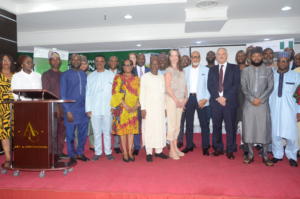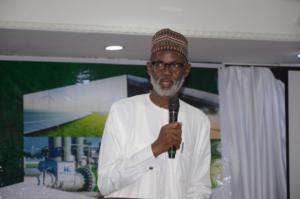The Federal Ministry of Budget and Economic Planning, in collaboration with the German- Nigerian Hydrogen office and key stakeholders organized a 2-day Working- Group workshop, to review the Zero draft of the Nigerian Hydrogen Policy.
The Workshop was designed to introduce participants to the vast potentials of hydrogen as a clean, sustainable and efficient energy source than could drive economic growth, improve energy security and support sustainable industrialization.
Declaring the Workshop open, in Abuja, the Minister of Budget and Economic Planning, Senator Abubakar Atiku Bagudu, explained that the hydrogen economy represented a critical component of the Nation’s strategy to diversify her energy mix, reduce dependence on fossil fuels and mitigate climate change. He noted that by harnessing the power of hydrogen, ‘we can create new opportunities, drive innovations and improve the lives of our citizens.’
 Globally, Bagudu maintained that Nigeria possessed the core assets to lead in the hydrogen economy space due to her abundant renewable energy sources, ideal for hydrogen production. ‘With strategic planning, hydrogen can become a cornerstone of our diversification agenda, reducing our over reliance on crude oil exports while unlocking new revenue streams, industrial development, regional trade and exports to the international market.
Globally, Bagudu maintained that Nigeria possessed the core assets to lead in the hydrogen economy space due to her abundant renewable energy sources, ideal for hydrogen production. ‘With strategic planning, hydrogen can become a cornerstone of our diversification agenda, reducing our over reliance on crude oil exports while unlocking new revenue streams, industrial development, regional trade and exports to the international market.
He stressed that the primary objective of the workshop was to gather experts’ feedback, constructive criticism and valuable insights to further refine and strengthen the policy with a view of establishing a comprehensive framework for Nigeria’s hydrogen economy.
The Minister of State for Petroleum Resources (Gas), Honourable Ekperikpe Ekpo, who was represented by his Technical Assistant, (Downstream) Mr. Abel Igheghe commended the German government for their unflinching support in advancing Nigeria’s energy transition effort. He described the German support as a bold vision to harnessing potentials and offering promising solution to addressing challenges.
The Energy Commission of Nigeria, represented by its Director, Renewable Energy, Mr. Ibrahim Sulu asserted that the Commission had been part of the hydrogen initiative, right from the onset and therefore pledged its continuous commitment to work with all Stakeholders.
Also speaking, the Ambassador of the Federal Republic of Germany to Nigeria, Mrs. Annett Gunther, said that the German-Nigerian Hydrogen office exemplified the country’s dedication to providing technical expertise, capacity building and knowledge transfer.
 Her words “we are actively exploring opportunities to enhance relationships, technology transfer and joint research initiatives in the hydrogen sector between our countries recognizing that this collaboration benefits both country’s economies. Germany envisions deepening collaboration with Nigeria on green hydrogen across the entire value chain from production to transportation, storage and utilization”
Her words “we are actively exploring opportunities to enhance relationships, technology transfer and joint research initiatives in the hydrogen sector between our countries recognizing that this collaboration benefits both country’s economies. Germany envisions deepening collaboration with Nigeria on green hydrogen across the entire value chain from production to transportation, storage and utilization”
According to Gunther, the partnership could create a model for sustainable development that balances economic growth with environmental responsibility.
Welcoming participants to the Workshop earlier, the country Director of GIZ Nigeria and Ecowas, Dr. Markus Wanger, said the stakeholder’s engagement marked a significant step in Nigeria’s journey towards energy transition and diversification of its energy economy.
Describing the National Hydrogen Policy draft as a milestone in advancing Nigeria’s policy and regulatory frame work for the development and diversification of the energy sector, Wanger assured that it would form the foundation upon which a future-oriented sustainable hydrogen economy in Nigeria could be built.
Other dignitaries at the occasion were: The Director, Department of Climate Change, Federal Ministry of Environment, Dr. Iniobong Abiola-Awe and the Deputy Director, Nigerian Midstream and Downstream Petroleum Regulatory Authority, (NMDPRA) Dr. Odafe Ejenavi, among others.
